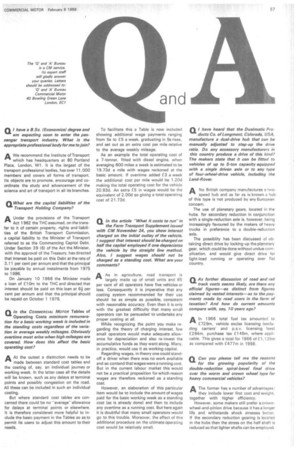Q In the COMMERCIAL MOTOR Tables of
Page 59

If you've noticed an error in this article please click here to report it so we can fix it.
Operating Costs minimum remuneration for a basic working week is included in the standing costs regardless of the variation in average weekly mileages. Obviously overtime must arise when high mileages are covered. How does this affect the basic operating cost?
AAt the outset a distinction needs to be
made between standard cost tables and the costing of, say, an individual journey or working week. In the latter. case all the details will be known, such as any delays at terminal points and possibly congestion on the road. All these can be included in such an individual costing.
But where standard cost tables are concerned there could be no "average" allowance for delays at terminal points or elsewhere. It is therefore considered more helpful to include the basic payment in the Tables so as to permit its users to adjust this amount to their needs. To facilitate this a Table is now included showing additional wage payments ranging from 5s to £5 a week, graduating in 5s rises, and set out as an extra cost per mile relative to the average weekly mileage.
As an example the total operating cost of a 7-tonner, fitted with diesel engine, when averaging 600 miles a week is estimated to be 19.73d a mile with wages reckoned at the basic amount. If overtime added £3 a week the additional cost per mile would be 1.20d making the total operating cost for the vehicle 20.93d. An extra £5 in wages would be the equivalent of 2.00d so giving a total operating cost of 21.73d.




































































































